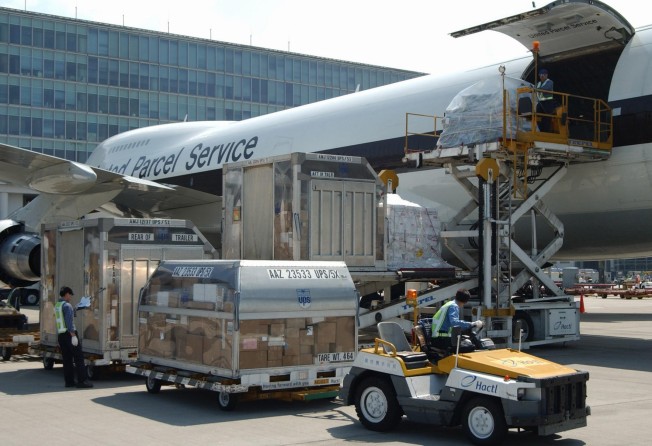Hi-tech turbulence in the skies
Air-cargo operators are feeling the pinch from a shift in the shipment of smart electronic devices to sea freight

Smaller and lighter mobile phones and tablet computers may be welcomed by consumers, but not by air-freight operators. Along with a shift in the transport of such high-technology products to sea freight, the more compact and lighter devices are eating into air-cargo revenues.
"Supply-chain management is much cleverer now, and electronic products don't necessarily go by air for their entire product life," said Mark Whitehead, chief executive of Hong Kong Air Cargo Terminals Ltd (Hactl).
That is partly why Hactl will report a slip in air cargo this year to 2.7 million tonnes from 2.77 million tonnes last year. The decline will be the company's first since 2009 when the global economic crisis dented demand.
The dip is the result of falling consumer demand in Western economies and a shift by exporters from shipping products by air to sea.
Air freight might now be used to cover no more than the first 10 days of sales of new products, Whitehead said. The remaining shipments throughout the short six-month product life of smartphones or personal electronic products, on average, will go by sea.
Importers might resort to air-freight orders again only if they were hit by delays in production or sales that exceeded expectations, and this trend could explain why the peak season for air freight had become shorter and the seasonality had flattened out over the past two years, he said.
"Margins of certain smart devices are being squeezed, and so logistics as a percentage of their total costs must come down, which means turning to sea freight," said Kelvin Leung, chief executive for Asia-Pacific at DHL Global Forwarding.
DHL's major rival, United Parcel Service, last week reported a 4 per cent fall in income in the second quarter from last year because its customers had traded down to lower-cost logistics solutions, including sea freight, from express services for the shipment of iPhones, high-fashion merchandise and spare parts.
Air hubs in greater China were hit by the trend. Hong Kong International Airport posted growth of just 2 per cent in air freight in the first half of this year, following a flat year last year, while Shanghai Pudong International Airport reported a 2.9 per cent dip.
The steadily widening spread of hi-tech manufacturing plants over the mainland also weighs on Hong Kong's air-cargo business. Apple's production lines operated by Taiwanese manufacturer Foxconn Technology have shifted to the provinces, with its Dongguan workforce shrinking from 900,000 workers to just 100,000 as it opened production lines in Zhengzhou in Henan province and Erdos in Inner Mongolia.
Previously, telecommunications products made in Dongguan were trucked over the short haul from Dongguan to Hong Kong and then flown around the world. But now exporters have more options and it may be cheaper for them to ship their cargo overseas directly from the mainland.
Hactl faces additional challenges as its major customer, Cathay Pacific Airways, began handling some of its own cargo and that of its subsidiary, Dragonair, in a facility it opened in late February. The operator plans to begin offering new value-added services from next year in the space vacated by Cathay's cargoes, which account for 40 per cent of Hactl's business.
The firm will also expand its intermodal services to the mainland. Currently, it operates a cross-border trucking company to six depots in southern China to serve customers in the Pearl River Delta and this contributes 10 per cent of its cargo volumes.
Despite the challenges, Whitehead said he was confident that Hactl's air-cargo business would continue to expand at about 5 per cent per annum on average and Hong Kong would remain an important gateway to southern China for the long term.